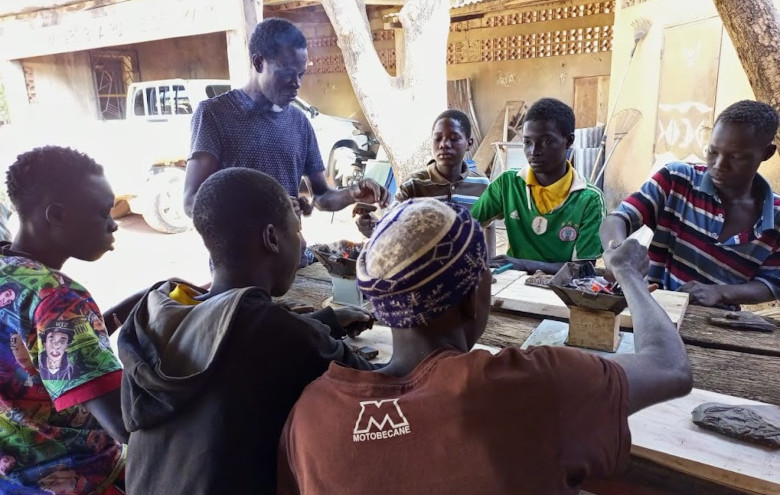Reuniting Families in Burkina Faso

By Jacinthe Maarifa, a new member of ATD’s Volunteer Corps in Burkina Faso
Fleeing insecurity for the big city
People say that Ouagadougou has more children and young people experiencing homelessness or poverty than similar major cities. Most came to this capital city from other parts of Burkina Faso, sometimes even from neighbouring countries.
Burkina Faso’s lack of safety and security is one of several reasons children and youth end up alone and in hardship. For more than seven years, many have left their homes in a “terrorist” area of the north to seek a fresh start in the capital. Back home, they lived an extremely precarious existence with little food or security. Often, their lives became even worse when they were separated from their families. Hoping for a better future in the city, they leave for Ouagadougou.
Reuniting families
This year, partnering with Caritas, ATD Fourth World has implemented a project to reunite families long-term. So far, the project has helped 30 previously homeless children and young people. During a year-long process, staff work with them to plan carefully for a return home.
During this time, they take part in supportive ATD activities as well as education and training workshops led by professionals. At the end, young people are ready to return to their families, rich with knowledge and experience. Perhaps more importantly, they are proud of what they can now contribute to life in their old community.
Going home isn’t simple
ATD Fourth World has a long history of supporting children and young adults who are homeless in Burkina Faso.
Although a child’s wellbeing depends on being reunited with their family, we know that it can’t happen overnight.
Life on the street affects children and young people deeply. Akim, for example, had been homeless for several years, and he is still quite young. Even after being reunited with his family, he explained that the hardest thing is the weight of the shame he feels on his shoulders.
- “People always treat you like a little kid when you live on the streets, and not like a normal child.”
Because this way of thinking has a profound impact on youngsters, reuniting with family is never as simple as just going home. Before they can return, children and young people need to know they can be useful in their local area. They need to feel dignified, worthy of holding a position of responsibility.
The abilities they learn in the program make others see them differently. And they come to see themselves as a member of society with something to contribute, a person who brings a strong hand of cards to the table. Knowing how to manage in the world of work helps give them something of value to add to their community. And it helps them undertake productive activities within the family business or perhaps to become entrepreneurial in the outside world.
Side-by-side, one step at a time
ATD works to support children and young people at their own pace, taking the time each individual needs to prepare to return home in their own way. For staff, this involves doing many activities side-by-side with participants. These activities run all year long, with no holidays or breaks.
Frequently, the ATD team sifts the town throughout the day to keep in touch with each child or young person they know. The team encourages them to come enjoy the Street Library, a special place where they can spend time with a group.
Often kids read together during the twilight hours before having to spend the night out in the open, all too often scared and alone.
A safe space to figure out who you are
Children and young people can also get together at ATD’s One Hundred Trades Courtyard. Here, they can feel totally safe, have a rest, and take care of themselves. The Courtyard also provides activities such as games or group educational opportunities. Importantly, it’s also a place where they can talk about what they are thinking and feeling.
These “time outs” and group learning experiences allow children and young people to discover—or re-discover—that they are better and stronger than they perhaps thought. With ATD, they’re no longer reduced to the image that others have of them, where nobody bothers to get to know them properly or see who they really are at heart.
During group activities in a safe space, they open up about their troubles. They reveal concerns deep in their heart, but also hopes and dreams for life beyond the here and now. Often, they leave feeling more positive about their future.
Knowing a trade makes all the difference
After choosing a trade they want to learn—frequently welding, ironmongery, and other mechanical abilities—job training takes place in two ways. Some children and young people work with an officially recognised workshop under the tutelage of a professional artisan. Visiting regularly, they learn the “tricks of the trade”. Whenever possible, this takes place not too far from the family home, so the child’s parents can follow their progress closely.
Others remain with the One Hundred Trades Courtyard where they learn to use materials like bronze and leather. Salif chose bronze:
- “I really apply myself so that I can learn well. I haven’t skipped a single class, not ever! Since I’ve been coming here and learning to smelt bronze, nothing could take me back to the streets. I’m going to get through this calmly, day by day.”

